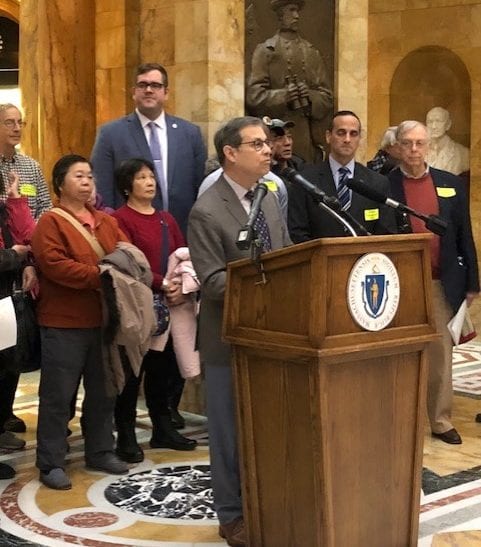
To say that Shameeka Moreno found an affordable home in the nick of time would be an understatement. The Roxbury mother had been homeless twice before, and she was facing displacement for a third time. Thankfully, she managed to settle into a low-cost apartment.
Many of her Boston neighbors weren’t so lucky.
A total of 6,203 people were declared homeless or in shelters last winter, according to Boston’s 39th Annual Homeless Census. That includes 1,221 families without a warm home to call their own.
Moreno told her story at a press conference supporting a real estate transfer tax proposal — introduced by City Councilor Lydia Edwards and backed by Mayor Martin Walsh — a measure that could raise up to $170 million per year for affordable housing production by collecting fees on property sales greater than $2 million.
Moreno now works with Parents Helping Parents, an organization that aids mothers and fathers in recovery. She has also worked with past inmates that live indeterminately in halfway houses.
There are 120 residents in the Coolidge House on Huntington Avenue, a “Residential Reentry Center” that houses offenders referred by the Federal Bureau of Prisons, Federal District Courts, and U.S. Probation. The facility helps men and women transition back into Boston communities, but many don’t meet the criteria for low-income housing. Past offenses, oftentimes regardless of the charge’s severity or time passed, prevent many Coolidge House residents and thousands of others in Massachusetts from finding affordable homes.
Most are left in a paradox: too poor to purchase housing, but ineligible to live in subsidized housing. Many return to a system that they escaped just moments before.
“You’re released, but you’re not released,” Moreno said. Returning to the halfway house is oftentimes inevitable.
Moreno’s boyfriend was charged with a drug offense five years ago but has successfully gotten his life back on track since then. Nevertheless, she says he is prohibited from living with his mother. He faces numerous risks when returning to the halfway house, yet has nowhere else to go.
Moreno stressed the urgency of the housing crisis.
“Black men are going back in the prison system because of things like housing,” she said.
Chuck Collins, a senior scholar at the Institute for Policy Studies, said that Boston’s housing emergency is partly driven by wealthy people moving back to Boston. Fifty years ago, much of the white middle class fled central cities. Now, the money is flooding back in.
Before Boston can implement the transfer tax, it must pass through the Massachusetts Legislature. Collins said he’s not confident the transfer tax will pass, but hopes the mayor uses his connections to encourage the legislature to adopt the bill. All that people are asking for, said Collins, is “the right to tax themselves.”
In the face of such a housing emergency, Collins said that the tax is not enough, but it’s a start.
“The urgency is so obvious,” he said.
Rent control, banned statewide in 1995, is another measure some have been pushing as a partial remedy for the housing crisis.
Joseph Curtatone, the mayor of Somerville, recently issued an address urging state legislators to lift the rent-control ban.
“It’s hard to call any community home when you fear displacement,” Curtatone told the Banner.
Marc Draisen, the executive director of the Metropolitan Area Planning Council and a former state representative, said that a quarter of low-income tenants spend more than 50 percent of their income on rent. Half of these residents spend more than 30 percent, Curtatone added. Although the current proposals are helpful, he said, we need a dramatic shift. Rather than furthering a division between the haves and have-nots, “everyone deserves an authentic opportunity to live… to raise their family,” Curtatone said.
“What kind of commonwealth do we want to be?” he asked.
Edwards said that the housing problem was rooted in a fear of exclusion. Many Bostonians tend to oppose the growth of affordable housing, believing that it isn’t for them. Edwards warned against this reluctance towards city growth, saying that scaling up the resources for affordable housing would be “transformative” and would protect communities for years to come.
It’s not just a Boston problem. All of Massachusetts suffers from this emergency. Although the housing prices are not as high west of Boston, the income is far lower. Therefore, inequity persists.
Rep. Dylan Fernandes of Falmouth expressed shock over the fast-paced development across Massachusetts.
“I cannot afford a home in my own district,” he said, adding that the median home price in Nantucket is a whopping $2.3 million. There, residents desperately hope to pass a tax for just half of a percent, rather than Boston’s proposed 2 percent.
“This housing crisis is crushing our working- and middle-class families in every community in this state,” Fernandes said.
Even when people are eligible for affordable housing, they often are placed on a waitlist, and the wait is considerable. They don’t wait for a few days, a few weeks, or even a few years. Curtatone estimated that it would take 17 years to provide a unit just to every senior/disabled person on the federal waitlist. It would take 22 years to do the same for every low-income family.
The transfer tax, said Draisen, will face pushback from the real estate industry as it works its way through the Legislature. People realize the urgency of the crisis, however, and Draisen said that the goal is to pass the bill before July 31.
The Walsh administration’s housing production goals aim to build more than 69,000 units by 2030, with 20 percent of that total designated affordable, but Draisen notes that the affordable units will require subsidy. Therein lies the difficulty: “It’s hard to use city budget dollars to subsidize housing,” he said.
As the press conference came to a quiet end, Shameeka Moreno looked out over an attentive crowd, dozens donning fluorescent stickers reading “Support Transfer Tax Now.” She quietly wiped tears from her eyes.
“Please help us pass this transfer fee,” she pled. “It would help a lot of people.”






